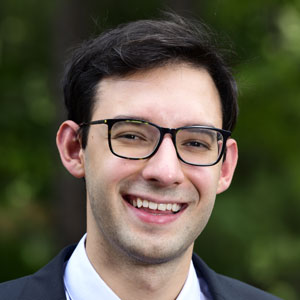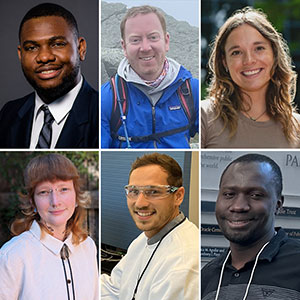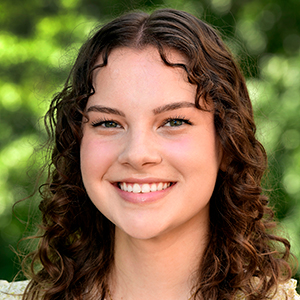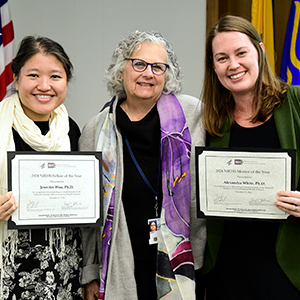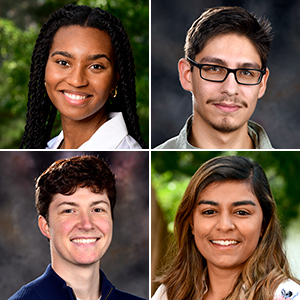Each year, early-career scientists from around the country — and the world — come to NIEHS to forge their professional paths. These postdoctoral, predoctoral, and postbaccalaureate fellows hone their skills, become well-prepared for a variety of careers, and make key contributions to the NIEHS scientific mission and culture.
At a Dec. 5 orientation meeting for new trainees, Environmental Factor interviewed Liz Garcia-Peterson, Ph.D. She joined NIEHS in October 2019 as a postdoctoral fellow in the Signal Transduction Laboratory, where she works under Xiaoling Li, Ph.D. Garcia-Peterson spoke about what sparked her research interests and what she hopes to accomplish at the institute.
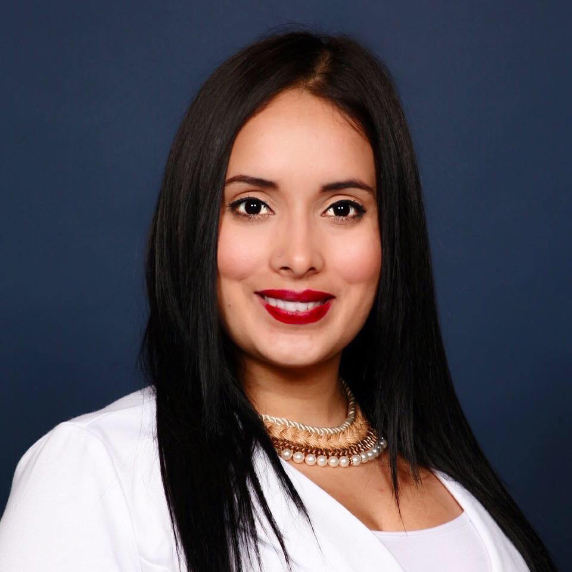 Garcia-Peterson works in the Metabolism, Genes, and Environment Group. (Photo courtesy of Liz Garcia-Peterson)
Garcia-Peterson works in the Metabolism, Genes, and Environment Group. (Photo courtesy of Liz Garcia-Peterson)EF: How did your journey to a science career begin?
LGP: I’m originally from Puerto Rico. First-generation college graduate. I earned my bachelor’s degree in biology at a small university there. I had the opportunity to go to a conference hosted by SACNAS [Society for Advancement of Chicanos/Hispanics and Native Americans in Science]. There, I saw all of the research conducted by the different universities and all of the things that could be done. I then decided to explore my options outside of the island.
So, I first did a summer internship at Arizona State University, and I learned about bioinformatics. After that, I interned at the University of Rochester in New York, where I worked on projects more involved in immunology. And back in Puerto Rico, I was a research assistant at the Institute of Neurobiology.
All of these different activities led me to want to go to graduate school. The problem is that the GRE [Graduate Record Examination] is in English, and our training was in Spanish. So, I had to work really hard to be more fluent.
EF: What brought you to NIEHS?
LGP: Eventually, I did postbaccalaureate training at the University of Chicago. There, they gave me GRE instruction. And they treated me basically as a Ph.D. student. I was in the branch of neuroscience, working with microglial cells.
After being there for a year and passing the GRE, I applied to the University of Wisconsin-Madison, and that’s where I started my Ph.D. work. I was in the molecular environmental toxicology program, and it gave me the opportunity to actually branch out to different fields.
At Madison, you get to do three lab rotations. I was interested in neuroscience, so I did two of them in that field. For the other rotation, I decided to do something different — I went into the dermatology department. I thought it was a better fit, so I accepted a position in that lab.
I focused on SIRT6 [one of 7 proteins in the sirtuins family] and the role it has in melanoma. I found that it helps to promote melanoma development. But I didn’t know the nitty-gritty of why that was the case. So, I looked for a postdoctoral position where I could better understand biological mechanisms involved in cancer growth.
I ended up interviewing with Xiaoling Li because she has done a lot of work on sirtuins, and I was accepted to come work at NIEHS.
EF: What will you research going forward?
LGP: Our lab is huge on the gut microbiome and metabolism. Right now, there are a few projects related to sirtuins, but because it is such a saturated field, I am leaning more toward other studies conducted in the lab. So, I am currently studying how epigenetic changes involving gut microbiota can impact cancer cell metabolism and growth.
I want to keep working on the different mechanisms involved in cancer metastasis and the different proteins associated with it. My main goal is to become a PI [principal investigator].
Dr. Li told me that to become a PI, I need to work hard, be disciplined, and develop a full story out of my research that could be the basis for my future studies — and be worth publishing in a good journal. I am excited for what lies ahead, and I will work hard to achieve my goals. I believe Dr. Li's lab, along with all of the resources at NIEHS, will help me become a better scientist.
(Jesse Saffron, J.D., is a technical writer-editor in the NIEHS Office of Communications and Public Liaison.)





